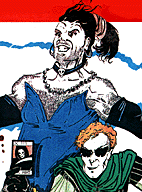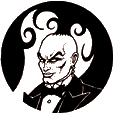| HOME | BOOKS | COMICS | RECORDS | NEWS | PEOPLE | PICTURES | ORDERS | HISTORY | office@savoy.abel.co.uk |
 |
Badly in Need of
Falstaff’s Fart b y A n d y R o b e r t s o n
Why Lord Horror and Meng & Ecker are a slash above the rest! Interzone 83 (1994) |
 DOES ANYONE STILL REMEMBER the confidence generated by Watchmen and The Dark Knight Returns ? When, for six months or so, it really seemed that the Graphic
Novel had grown up? People who would never normally look at a
comic, let alone a 200-page b d, read one or other and sat back
amazed. Gollancz set up a line in publications that were not comics,
and were not aimed at the adolescent market, and other publishers
followed suit. A real window of opportunity opened, but, though
we've had countless attempts to fulfil the promise since then,
and adult graphic novels are still being published in some numbers,
does anyone still believe? After eight years, what remains? DOES ANYONE STILL REMEMBER the confidence generated by Watchmen and The Dark Knight Returns ? When, for six months or so, it really seemed that the Graphic
Novel had grown up? People who would never normally look at a
comic, let alone a 200-page b d, read one or other and sat back
amazed. Gollancz set up a line in publications that were not comics,
and were not aimed at the adolescent market, and other publishers
followed suit. A real window of opportunity opened, but, though
we've had countless attempts to fulfil the promise since then,
and adult graphic novels are still being published in some numbers,
does anyone still believe? After eight years, what remains?
People still talk about the new maturity of comics. I've got an example of people talking about it in front of me now: the review slip for David Gemmell's Legend, adapted by Stan Nicholls and illustrated by Fangorn. To be fair, Gemmell's heroic fantasy is quite competently treated, but I'm afraid the whole effect is about what you'd expect on the back of a cornflakes packet. But the publicity blurb makes great play with our two ground-breaking works, and announces that graphic novels must now be considered an adult art-form, as if nothing had happened since 1986. Maybe nothing has. What went wrong? Two things, I think. The first is that comics, especially comics in the USA, could never shake off their obsession with the superhero. Panel art is by its nature exceptionally well suited to all sorts of fantasy, from historical romance to sf, but a malign historical accident has warped half the comics of the English-speaking world into one tiny sub-genre, and no attempt to break out of it has escaped the dead hand of the market. Watchmen and The Dark Knight Returns might have been called parodic superhero comics: attempts to infiltrate some reality and see what happens. This worked stunningly well once or twice, but it has been losing impact each time, endlessly repeated. Witness, for instance, Marshall Law by Pat Mills and Kevin O'Neill. If we've had superheroes-as-ordinary-people and superheroes-as-sexually-inadequate-fascists, this one might best be described as superheroes-as-a-war-vet-criminal-underclass. Actually, I quite liked it. But what it really goes to show is how easily a radical idea can be tamed, circumscribed, and turned into one more convention. We need fewer superheroes. The second problem—and this hit the UK harder than the USA—is Political Correctness, the Ben Eltonization of comicdom. This is best illustrated by the decay of 2000 AD, still Britain's best comic and the only place where mutant ideas writhe with the real pulp fervour. The comic was gutted of its best writers and artists to support Crisis, an "adult" publication dedicated to the glubglub womangood, manbad, blackgood, whitebad which is the croak of Lafferty's Secret Crocodile in this age. When Crisis predictably bombed, the same themes were crushed into 2000 AD, further ruining it, though for a time Judge Dredd exhibited a weird undead vigour. 2000 AD has recently been given a break from re-educating us all, and it staggers on, but the torch of political correctness has passed to publications like Deadline. At the moment there isn't much hope of "adult" comics in the UK reflecting the realities of contemporary life without the filters of dogma, let alone generating powerful and fruitful fantasy. That's not to say PC is absent in USA comix, though it is not usually so pretentious or so hollow as it is in another one we have to review, Grendel: Warchild. I can only describe this as, quite uniquely, combining the worst of East and West—the childish US obsession with superheroes and the childish Oriental obsession with martial-art ninja types. Add to this carefully proportioned skin colours, no sex that is not either lesbian, troilistic or inter-racial, the Correct number of women in positions of power, and so on, and it becomes obvious why it won an award. The plot is a run-of-the-mill lost-heir-returns-guided-by-invincible-warrior: the art is serviceable but poor. Give it a miss. Up from down under, I had heard good things about the Australian dominatrix Tank Girl, but I am afraid this compilation is only a couple of grades above Redfox. Behind the feminist veneer are basically a lot of pictures of girlie(s) with big bazookas acting tough, drawn by, and for a market of, boys afraid of sex. It wants to be reeely reeely hard, but it just can't get it up. Sorry. With the impact of Punch's prick and the resonance of Falstaff's fart, in bursts Meng & Ecker no. 7: not Ben Elton, but Chubby Brown. After sampling this I buckled and sent off for the whole series, and I think it's gorgeous. I particularly liked no. 2, where the brothers have to redeem a conference on literature at Oxford. They do this by messily decapitating Melvyn Bragg, John Fowles, Anita Brookner and Martin Amis and replacing their heads by, respectively, those of Ishmael Reed, Henry Treece, C L Moore, and William Hope Hodgson. Drastic, but not unreasonable. I also got Lord Horror numbers 1-7, a more serious, more flawed, but very interesting sequence. Though the first two are nothing to get excited about, the run of 3-7, set in a weird alternative wartime, are exquisite. These are the only things I've seen in the last six months that I can really recommend, and if you are bored sick you could do worse than send a few tenners to Manchester. You'll get something back that you may not like, but I guarantee that it will glut you for a week or two. •
|
| Main Comics Page | Lord Horror | Meng & Ecker | Other Comics | Articles | The Reverbstorm Appendix | Links |